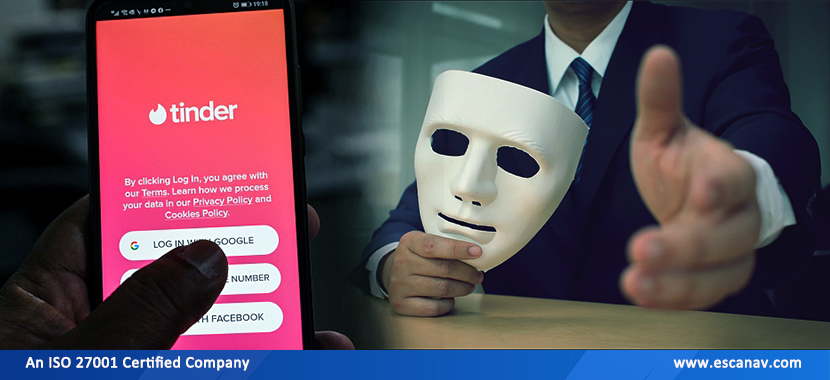Explore what Tinder knows about you and how criminals can use your data to improve their scams and attacks.
Tinder is watching every swipe you make.
No matter how much you know about Tinder, you may be surprised by what Tinder knows about you.
Using social media always involves complicated privacy trade-offs. Especially when it comes to dating apps.
Those seeking a romantic match should present their authentic selves on their profiles. It’s imperative, however, to do this without oversharing and revealing too much about yourself. Also, you want to know enough about your potential date before setting up a date, so you can find out whether they are an axe murderer.
However, Tinder has an astonishing amount of user data.
In 2017, Judith Duportail of The Guardian requested her personal data from the app under the EU’s data protection law. She received 800 pages that included all the friends she liked on Facebook, the ages of the people she was interested in dating, and the times, dates, and locations of every conversation she had with her matches.
No matter how locked down your privacy is, putting yourself out there on any dating app is risky. Because dating strangers can be complicated, you should at least be aware of what Tinder and its users may know about you. Here are four things Tinder knows about its users.
1. Tinder knows everything you do on Tinder
Every match. Every swipe. In every conversation, Tinder knows everything about what you do on Tinder. You might not mind because how the app uses this data to power its algorithm has contributed to its enormous success. The app reflects your preferences by allowing you to easily swipe approval or disapproval of every possible match it suggests. Tinder should give a better experience by knowing your preferences.
Your app doesn’t simply use your information to improve your experience.
Tinder and other popular dating apps were accused by the Norwegian Consumer Council of improperly selling consumer data to third parties to improve advertising targeting in 2020
2. Tinder is aware of your online activities thanks to your associated Facebook or Instagram accounts.
Tinder has access to all of your public data on Facebook and Instagram if your Tinder account is linked to them.
Data sharing with Facebook comes with its own set of privacy concerns. Because Facebook knows so much about you already, you may not be overly concerned about restricting access to your information if you use it regularly. Your concerns may arise, however, if you use the app for dating.
Using a dummy Facebook or Instagram account with an email account you create just for dating can help you limit access to your data. Ensure that the privacy settings of that account, as well as all the others you use on Facebook, are locked down.
Maintaining as much privacy as possible is the goal, not deceiving anyone. Are you curious if Tinder is connected to your Facebook account? Be sure to check the settings of your Facebook apps and websites.
3. Tinder is aware of and may share information that could assist a stranger in learning more about you — possibly even your location.
Whether you share words or images about yourself, be careful what you share.
Profile pictures are the most identifiable thing on your profile. Using a photo that you only use for dating purposes is recommended by cyber security experts. If the photo can’t be run through image searches to match the photo with your real identity, then it can’t be linked to you. Also, the background of your photos could provide information about who you are.
Likewise, sharing your specific job title or employer makes you more easily recognizable. While that may be fine with you, you should be aware of the risks associated with connecting your Tinder life to your real life.
You want potential dates to get a sense of who you are, but you don’t want strangers to know everything about you. Considering this, Tinder knows your exact location and uses it to find matches for you. By using the app to triangulate where you are, they could conceivably get a good idea of your approximate location without revealing this information.
4. Tinder knows you open yourselves to scams by opening your heart
On dating apps, overexposure can present a variety of risks, including personal harm. As the most common form of online fraud, romance scams trail only investment scams.
According to the recent Netflix hit documentary The Tinder Swindler, a man posing as a diamond dealer scammed potential partners into giving him loans he never intended to pay back.
An extreme case of fraud should serve as a reminder that all dating apps expose us to risks that are often overshadowed by strong emotions in new relationships. A secure or privacy-conscious app won’t help us avoid the mistakes we make in a fog of love or lust, no matter how secure it is.
It is possible that even if you do not directly encounter a scammer, you could still be susceptible to scams committed by online criminals who use the Tinder brand to enhance their attacks. Spam and phishing scams use the feeling of connection to enhance their effectiveness with fake emails, SMS messages, and notifications.
If you’re online dating at all, you should keep your guard up and practice all the basics of good online security and identity protection even more diligently.
Secure your online identity with eScan Total Security
Your identity can be stolen if your private data is breached. It is expensive and painful to fix ID theft. Taking steps to prevent identity theft can save you both time and money.
By using eScan Total Security, you are able to protect yourself against identity theft. Password managers, data breach monitoring, antivirus programs that block phishing websites, and VPNs all make stealing your personal information more difficult. A 30-day free trial is available for eScan Total Security. Contact Us







